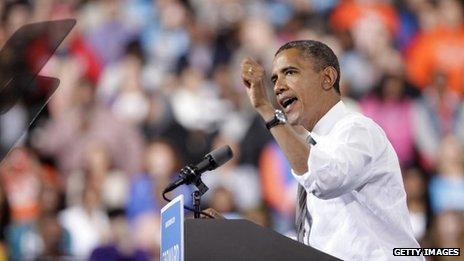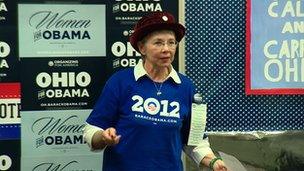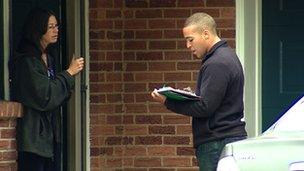Obama keeps eye on Ohio ground game
- Published
- comments

Recent opinion polls have shown President Obama leading in Ohio
"It's been a long, long, long time coming." The young man wrings every last ounce of emotion from the Sam Cooke classic that became the theme of the civil rights movement.
He ends up - to laugher and applause from the audience - crooning: "With President Obama change will come... Ooh yes it will."
He is the star act at the opening of the Democrats', external latest field office in the key swing state of Ohio, external. This one, in the small city of Xenia, external, means there are now over 100 field offices in this vital state and the volunteers gathered seem imbued with a sense of righteous mission.
Billions of dollars are being spent on adverts, President Barack Obama is in the state for his 29th visit and the Washington Post has an article, external detailing how federal money seems to have poured into the state, where unemployment is now lower than the national average.
Ohio is seen as critical - it has voted for the winning candidate in the last 10 presidential elections.
Art of canvassing
Ads, money and visits will all have an influence on the outcome of the election, but perhaps the people in Xenia, and those like them, are the foot soldiers who will really deliver victory - or defeat. This is the ground game.
The walls are decorated with signs of varying degrees of professionalism. Some are glossy printed products: Women for Obama, African Americans for Obama, and Gotta vote.

Dorris Adams came out of retirement to canvas for President Obama
Others are home-made reminders in felt-tipped pen of the countdown to postal voting, the need for someone to buy loo paper and an introduction to the senior staff.
Twenty-something Nicki's favourite colour is green, and favourite foods are mac-and-cheese and sushi (not together, one hopes).
When I start asking questions about strategy and ask for an interview, she tells me she is too cute to be interrogated. Too acute, too, probably. The ground game is Team Obama's secret weapon.
It is frustrating trying to get a handle on how it works in detail. At the Obama HQ in Chicago I have seen the relentless focus on the individual groups that made up the Obama coalition in 2008 - from Hispanics to gay people to single mums.
Here, I do not detect that narrow targeting. But there are a lot of lists and a lot of data and a reliance on the old-fashioned art of canvassing.
The Democrats' county chair, Doris Adams, tells me Xenia is the belly button of Republicanism - and she seems to be determined to give the rival party a poke in the tummy.
She tells me that at 65 years old she had hoped to start her retirement re-watching Midsomer Murders and Poirot, the British murder mysteries she loves, but the cause is too important.
She believes in the old-fashioned art of personal canvassing.
"Every vote counts and we are going after every vote, sharing our vision for the future," Ms Adams says.
"When somebody talks to me about the issues that they are afraid of we can reassure them there is hope for the future and not listen to the smoke-and-mirrors and the fear that is mongered."
Encouraging voter turnout
Earlier, I went out canvassing in another area of Ohio, near Dayton, with volunteer Terrance Hodges.
This is the basics, the foundation. He has a list that will say how someone voted in the last election and his job is to find out what they will do this time round.
One Strong Obama has switched to Strong Romney. He will report back to his field office, but moves on without trying to persuade.
He has two sets of leaflets. Someone leaning to Mr Obama will get a glossy brochure, setting out the case for the president's re-election.
But strong supporters get instead a form encouraging them to use a postal vote, or absentee ballot, as they are known here. This has multiple benefits (and the Romney team are doing the same).
Mr Hodges says: "It's a lot easier. It's not a hassle for them. They could be watching TV in their house, filling out the form and mailing it back out.

"As soon as you start putting limitations on people's voting behaviour you are disenfranchising them.
"Voter turnout is not that high and we want to keep that number, raise those numbers, and make voting as easy as possible".
I suggest it also makes it easier to check up whether people have voted, and push them to do so, but he demurs.
I bet if people say they will use a postal vote, they can expect a follow-up phone call or two.
I have long said the key to this election will be turnout. President Obama has to reassemble as much of his 2008 coalition as possible to win.
For him, people who prefer him to Mr Romney, but cannot be bothered to get off the sofa on polling day, could end his hopes of a second term.
That is why I am cautious about those opinion polls, external for President Obama in this state.
People may describe themselves as "likely voters" to pollsters, and still not do the deed on election day.
Persuading them to vote by post means the vagaries of the weather, last-minute doubts or a car that won't start are removed from the equation.
Elections are like war in one thing at least - what goes on in the air is vitally important, but in the end the game is won by foot soldiers on the ground.